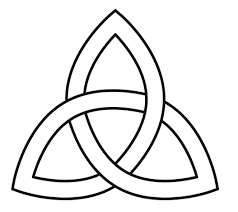THE TRINITY IN PRACTICE
INTRODUCTION

Last week I explained how the word ‘Trinity’ came to be coined and its fundamental meaning – three dimensions of God rather than three persons, which in modern English means something very different from the original sense. This blog looks at some of the practical consequences.
TRINITY AND WORLD FAITHS
Christianity, in all its forms, is the most widespread religion in the world. The next in order of adherents, though not of time, are Islam, then Hinduism, Buddhism, Sikhism and Judaism. (Other affiliations are secularism, including agnosticism and atheism, traditional religions, and spiritualism). How can Christians hold a world view which takes them seriously without falling into wholesale condemnation or a spineless tolerance? The answer is the Trinity.

Let’s think about these faiths. Islam holds a very transcendent view of God, so far beyond us that he cannot be questioned, yet he is “nearer than the vein in your neck”.
Hinduism holds a two-stage view of reality. The lower reality is everything we can touch and know, including divinities we experience, thousands of them. Some Christians think that three most popular gods, Shiva, Vishnu and Brahma, the ‘trimurti’, are like the Trinity. That is a mistake. The Trinity, God, the Godhead, is infinitely beyond the created order. The meditative teachings of the Upanishads talk of Brahma, the utterly transcendent One, and Atman, the utterly immanent One. A possible illustration is to hold God as a circle whose centre is everywhere and whose circumference is nowhere.
Sikhism is a devotional faith which aimed to bring together Islam and Hinduism.
Buddhism is a devoutly agnostic faith, which spends no time in thinking about any kind of transcendent power, but where deep meditation practice can bring one eventually to transcendence or Nirvana.
Judaism is rooted in the oneness of God: “Hear, Israel, the LORD your God, the Lord is one.” I heard a rabbi expounding it as follows: God is not many – not lots of little gods; He is not three – as if Christians believe in three separate gods; He is not two – the principle of good on an equal footing as the principle of evil (Zoroasteranism); He is not none – atheism has got reality wrong. But within the Jewish Scriptures are hints that more is going on in creation, particularly though the Word and the Wisdom of God. The whole of Christian theology is an attempt to combine the unity of the Godhead with the three ways we encounter him through Christ.
I see the Trinity as an expression of God along the whole range of human experience. Islam witnesses to the transcendence of God, God beyond us, the father, Creator of everything. Hinduism and perhaps Buddhism witnesses to the inner work of God with in everything, including our hearts and minds.

What about the Son, the Word, the agent of God in revelation? This is only hinted in other faiths, though they all in some way witness to his reality. I find it fascinating that in the Hindu Upanishads there is just one description of the supreme spiritual reality, ‘sat-cit-ananda’ shortened to saccinananda. ‘Sat’ means ‘I am’ – like the vision given to Moses at the burning bush. ‘Cit’ means something like intelligence, and is an exact parallel to the Logos or the Word in John’s Gospel chapter 1. ‘Ananda’ means joy or bliss – not bad for the Spirit. An interesting hint.
It is my contention that all genuine movements of human spirituality can find a home within the teaching of the Trinity.
TRINITY AND PROCLAMATION
I once knew a vicar who had married a Russian woman, brought up in the Soviet Union. There was no hint of anything spiritual in her whole upbringing. But when she married an English vicar, she could relate to the idea of God, because she had experienced that feeling of immensity and beyondness because she had lived by the sea. The Spirit she experienced in Christian worship. Jesus she found more difficult until she went to an Orthodox monastery in Essex, and Jesus came alive for her in the Jesus Prayer: “Lord Jesus Christ, Son of God, have mercy on me, a sinner.” This is an example how people who are far from the Christian faith can be touched by each of the aspects of the Trinity.
My own experience is that when I talk with people for whom ‘God’ is a difficult if not a downright irrational concept, that to describe ‘God’ as the one beyond us, with us, and in us, the frequent response is “That makes sense”. The Trinity is a gift!
TRINITY AND PRAYER
The Trinity can also be a programme for growth in prayer.
Worship

If God the Father is the one beyond us and beyond all contingent beings, the source and fount of creation, then praise, worship and thanksgiving is the appropriate response. As we lift our hearts in worship we become bigger people, less “the heart turned in on itself”, in Martin Luther’s phrase. The Psalms are full of calls to worship, e.g. Psalms 95 – 100.
Prayer for Self and Others
The prayer that Jesus taught his disciples, the Lord’s Prayer (‘Our Father’, Matthew 6.9-13, Luke 11.2-4) both lifts our hearts to God beyond us, and brings our physical and spiritual needs before him. We do not need to be backwards in coming forwards with our concerns, worries, or distresses.
Jesus also held to the command in the Old Testament/Tenakh, to “love your neighbour as yourself” (Leviticus 19.18). A simple way I use is to remember individuals and pray, “God, bless x and give them what they need”.
Meditation/Contemplation
St Paul tells us that “the Spirit helps us in our weakness; for we do not know how to pray as we ought, but that very Spirit intercedes with sighs too deep for words.” (Romans 8.26). It’s when we run out of words and simply seek God in silence that we may well be closest to God and experience the Holy Spirit present in our hearts.
IN CONCLUSION
You can see that I am a big fan of the Trinity as a way of approaching God. To talk of God as the One beyond us and with us and in us makes sense to most people of any age. And of course it means that we will never have God ‘sussed’. Hallelujah!
